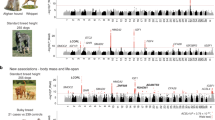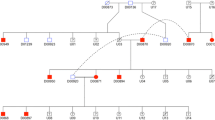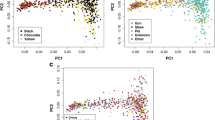Abstract
Identifying regions of artificial selection within dog breeds may provide insights into genetic variation that underlies breed-specific traits or diseases—particularly if these traits or disease predispositions are fixed within a breed. In this study, we searched for runs of homozygosity (ROH) and calculated the d i statistic (which is based upon F ST) to identify regions of artificial selection in Standard Poodles using high-coverage, whole-genome sequencing data of 15 Standard Poodles and 49 dogs across seven other breeds. We identified consensus ROH regions ≥1 Mb in length and common to at least ten Standard Poodles covering 0.6 % of the genome, and d i regions that most distinguish Standard Poodles from other breeds covering 3.7 % of the genome. Within these regions, we identified enriched gene pathways related to olfaction, digestion, and taste, as well as pathways related to adrenal hormone biosynthesis, T cell function, and protein ubiquitination that could contribute to the pathogenesis of some Poodle-prevalent autoimmune diseases. We also validated variants related to hair coat and skull morphology that have previously been identified as being under selective pressure in Poodles, and flagged additional polymorphisms in genes such as ITGA2B, CBX4, and TNXB that may represent strong candidates for other common Poodle disorders.



Similar content being viewed by others
References
Akey JM, Ruhe AL, Akey DT et al (2010) Tracking footprints of artificial selection in the dog genome. Proc Natl Acad Sci USA 107:1160–1165. doi:10.1073/pnas.0909918107
Ashburner M, Ball CA, Blake JA et al (2000) Gene ontology: tool for the unification of biology. The gene ontology consortium. Nat Genet 25:25–29. doi:10.1038/75556
Axelsson E, Ratnakumar A, Arendt M-L et al (2013) The genomic signature of dog domestication reveals adaptation to a starch-rich diet. Nature 495:360–364. doi:10.1038/nature11837
Ben Yehuda S, Dix I, Russell CS et al (1998) Identification and functional analysis of hPRP17, the human homologue of the PRP17/CDC40 yeast gene involved in splicing and cell cycle control. RNA 4:1304–1312
Bhoj VG, Chen ZJ (2009) Ubiquitylation in innate and adaptive immunity. Nature 458:430–437. doi:10.1038/nature07959
Bolger AM, Lohse M, Usadel B (2014) Trimmomatic: a flexible trimmer for Illumina sequence data. Bioinformatics 30:2114–2120. doi:10.1093/bioinformatics/btu170
Boyko AR (2011) The domestic dog: man’s best friend in the genomic era. Genome Biol 12:1
Boyko AR, Quignon P, Li L et al (2010) A simple genetic architecture underlies morphological variation in dogs. PLoS Biol 8:e1000451. doi:10.1371/journal.pbio.1000451
Brønstad I, Skinningsrud B, Bratland E et al (2014) CYP21A2 polymorphisms in patients with autoimmune Addison’s disease, and linkage disequilibrium to HLA risk alleles. Eur J Endocrinol 171:743–750. doi:10.1530/EJE-14-0432
Cadieu E, Neff MW, Quignon P et al (2009) Coat variation in the domestic dog is governed by variants in three genes. Science 326:150–153. doi:10.1126/science.1177808
Callan MB, Werner P, Mason NJ et al (2013) Polymorphisms in canine platelet glycoproteins identify potential platelet antigens. Comp Med 63:348–354
Candille SI, Kaelin CB, Cattanach BM et al (2007) A β-defensin mutation causes black coat color in domestic dogs. Science 318:1418–1423. doi:10.1126/science.1147880
Chang CC, Chow CC, Tellier LC et al (2015) Second-generation PLINK: rising to the challenge of larger and richer datasets. Gigascience 4:7. doi:10.1186/s13742-015-0047-8
Chen EY, Tan CM, Kou Y et al (2013) Enrichr: interactive and collaborative HTML5 gene list enrichment analysis tool. BMC Bioinformatics 14:128. doi:10.1186/1471-2105-14-128
Danecek P, Auton A, Abecasis G et al (2011) The variant call format and VCFtools. Bioinformatics 27:2156–2158. doi:10.1093/bioinformatics/btr330
Davydov EV, Goode DL, Sirota M et al (2010) Identifying a high fraction of the human genome to be under selective constraint using GERP++. PLoS Comput Biol 6:e1001025. doi:10.1371/journal.pcbi.1001025
DePristo MA, Banks E, Poplin R et al (2011) A framework for variation discovery and genotyping using next-generation DNA sequencing data. Nat Genet 43:491–498. doi:10.1038/ng.806
Egenvall A, Bonnett BN, Häggström J (2006) Heart disease as a cause of death in insured Swedish dogs younger than 10 years of age. J Vet Intern Med 20:894–903
Freedman AH, Gronau I, Schweizer RM et al (2014) Genome sequencing highlights the dynamic early history of dogs. PLoS Genet 10:e1004016. doi:10.1371/journal.pgen.1004016
Friedenberg SG, Meurs KM (2016) Genotype imputation in the domestic dog. Mamm Genome. doi:10.1007/s00335-016-9636-9
Goldstein O, Mezey JG, Boyko AR et al (2010) An ADAM9 mutation in canine cone-rod dystrophy 3 establishes homology with human cone-rod dystrophy 9. Mol Vis 16:1549–1569
Goode DL, Cooper GM, Schmutz J et al (2010) Evolutionary constraint facilitates interpretation of genetic variation in resequenced human genomes. Genome Res 20:301–310. doi:10.1101/gr.102210.109
Grindem CB, Breitschwerdt EB, Corbett WT, Jans HE (1991) Epidemiologic survey of thrombocytopenia in dogs: a report on 987 cases. Vet Clin Pathol 20:38–43
Häggström J, Hansson K, Kvart C (1992) Chronic valvular disease in the cavalier King Charles spaniel in Sweden. Vet Rec 131:549–553
Hanson JM, Tengvall K, Bonnett BN, Hedhammar A (2015) Naturally occurring adrenocortical insufficiency—an epidemiological study based on a Swedish-insured dog population of 525,028 dogs. J Vet Intern Med. doi:10.1111/jvim.13815
Hirano M, Quinzii CM, Mitsumoto H et al (2011) Senataxin mutations and amyotrophic lateral sclerosis. Amyotroph Lateral Scler 12:223–227. doi:10.3109/17482968.2010.545952
Jones P, Chase K, Martin A et al (2008) Single-nucleotide-polymorphism-based association mapping of dog stereotypes. Genetics 179:1033–1044. doi:10.1534/genetics.108.087866
Kanehisa M, Goto S (2000) KEGG: Kyoto encyclopedia of genes and genomes. Nucleic Acids Res 28:27–30
Kanehisa M, Goto S, Sato Y et al (2013) Data, information, knowledge and principle: back to metabolism in KEGG. Nucleic Acids Res 42:D199–D205. doi:10.1093/nar/gkt1076
Karlsson EK, Lindblad-Toh K (2008) Leader of the pack: gene mapping in dogs and other model organisms. Nat Rev Genet 9:713–725. doi:10.1038/nrg2382
Karlsson EK, Baranowska I, Wade CM et al (2007) Efficient mapping of mendelian traits in dogs through genome-wide association. Nat Genet 39:1321–1328. doi:10.1038/ng.2007.10
Kenmochi N, Kawaguchi T, Rozen S et al (1998) A map of 75 human ribosomal protein genes. Genome Res 8:509–523
Kim E-S, Sonstegard TS, Van Tassell CP et al (2015) The relationship between runs of homozygosity and inbreeding in jersey cattle under selection. PLoS One 10:e0129967. doi:10.1371/journal.pone.0129967
Kobe B, Kajava AV (2001) The leucine-rich repeat as a protein recognition motif. Curr Opin Struct Biol 11:725–732
Koehli S, Naeher D, Galati-Fournier V et al (2014) Optimal T-cell receptor affinity for inducing autoimmunity. Proc Natl Acad Sci USA 111:17248–17253. doi:10.1073/pnas.1402724111
Ku CS, Naidoo N, Teo SM, Pawitan Y (2011) Regions of homozygosity and their impact on complex diseases and traits. Hum Genet 129:1–15. doi:10.1007/s00439-010-0920-6
Kumar P, Henikoff S, Ng PC (2009) Predicting the effects of coding non-synonymous variants on protein function using the SIFT algorithm. Nat Protoc 4:1073–1081. doi:10.1038/nprot.2009.86
Kyöstilä K, Cizinauskas S, Seppälä EH et al (2012) A SEL1L mutation links a canine progressive early-onset cerebellar ataxia to the endoplasmic reticulum-associated protein degradation (ERAD) machinery. PLoS Genet 8:e1002759. doi:10.1371/journal.pgen.1002759
Li H, Durbin R (2009) Fast and accurate short read alignment with Burrows–Wheeler transform. Bioinformatics 25:1754–1760. doi:10.1093/bioinformatics/btp324
Lindblad-Toh K, Wade CM, Mikkelsen TS et al (2005) Genome sequence, comparative analysis and haplotype structure of the domestic dog. Nature 438:803–819. doi:10.1038/nature04338
Mao JR, Taylor G, Dean WB et al (2002) Tenascin-X deficiency mimics Ehlers–Danlos syndrome in mice through alteration of collagen deposition. Nat Genet 30:421–425. doi:10.1038/ng850
Mao Y, Tamura T, Yuki Y et al (2016) The hnRNP-Htt axis regulates necrotic cell death induced by transcriptional repression through impaired RNA splicing. Cell Death Dis 7:e2207. doi:10.1038/cddis.2016.101
Mardaryev AN, Liu B, Rapisarda V et al (2016) Cbx4 maintains the epithelial lineage identity and cell proliferation in the developing stratified epithelium. J Cell Biol 212:77–89. doi:10.1083/jcb.201506065
Marsden CD, Ortega-Del Vecchyo D, O’Brien DP et al (2015) Bottlenecks and selective sweeps during domestication have increased deleterious genetic variation in dogs. Proc Natl Acad Sci USA. doi:10.1073/pnas.1512501113
McKenna A, Hanna M, Banks E et al (2010) The genome analysis toolkit: a MapReduce framework for analyzing next-generation DNA sequencing data. Genome Res 20:1297–1303. doi:10.1101/gr.107524.110
McLaren W, Pritchard B, Rios D et al (2010) Deriving the consequences of genomic variants with the Ensembl API and SNP effect predictor. Bioinformatics 26:2069–2070. doi:10.1093/bioinformatics/btq330
Metcalfe P, Watkins NA, Ouwehand WH et al (2003) Nomenclature of human platelet antigens. Vox Sang 85:240–245
Metzger J, Karwath M, Tonda R et al (2015) Runs of homozygosity reveal signatures of positive selection for reproduction traits in breed and non-breed horses. BMC Genom 16:764. doi:10.1186/s12864-015-1977-3
Meurs KM, Mauceli E, Lahmers S et al (2010) Genome-wide association identifies a deletion in the 3′ untranslated region of striatin in a canine model of arrhythmogenic right ventricular cardiomyopathy. Hum Genet 128:315–324. doi:10.1007/s00439-010-0855-y
Nicholson MJ, Hahn M, Wucherpfennig KW (2005) Unusual features of self-peptide/MHC binding by autoimmune T cell receptors. Immunity 23:351–360. doi:10.1016/j.immuni.2005.09.009
Ogo OA, Tyson J, Cockell SJ et al (2015) The zinc finger protein ZNF658 regulates the transcription of genes involved in zinc homeostasis and affects ribosome biogenesis through the zinc transcriptional regulatory element. Mol Cell Biol 35:977–987. doi:10.1128/MCB.01298-14
Ohashi PS (2002) T-cell signalling and autoimmunity: molecular mechanisms of disease. Nat Rev Immunol. doi:10.1038/nri822
Parker HG, VonHoldt BM, Quignon P et al (2009) An expressed Fgf4 retrogene is associated with breed-defining chondrodysplasia in domestic dogs. Science 325:995–998. doi:10.1126/science.1173275
Pedersen NC, Brucker L, Tessier NG et al (2015) The effect of genetic bottlenecks and inbreeding on the incidence of two major autoimmune diseases in standard poodles, sebaceous adenitis and Addison’s disease. Canine Genet Epidemiol 2:14. doi:10.1186/s40575-015-0026-5
Purfield DC, Berry DP, McParland S, Bradley DG (2012) Runs of homozygosity and population history in cattle. BMC Genet 13:70. doi:10.1186/1471-2156-13-70
Quignon P, Giraud M, Rimbault M et al (2005) The dog and rat olfactory receptor repertoires. Genome Biol 6:R83. doi:10.1186/gb-2005-6-10-r83
R Core Team (2016) R: a language and environment for statistical computing. R Foundation for Statistical Computing, Vienna, Austria. https://www.R-project.org/
Schlamp F, van der Made J, Stambler R et al (2016) Evaluating the performance of selection scans to detect selective sweeps in domestic dogs. Mol Ecol 25:342–356. doi:10.1111/mec.13485
Schmutz SM, Berryere TG, Goldfinch AD (2002) TYRP1 and MC1R genotypes and their effects on coat color in dogs. Mamm Genome 13:380–387. doi:10.1007/s00335-001-2147-2
Schoenebeck JJ, Hutchinson SA, Byers A et al (2012) Variation of BMP3 contributes to dog breed skull diversity. PLoS Genet 8:e1002849. doi:10.1371/journal.pgen.1002849
Scrivens PJ, Noueihed B, Shahrzad N et al (2011) C4orf41 and TTC-15 are mammalian TRAPP components with a role at an early stage in ER-to-Golgi trafficking. Mol Biol Cell 22:2083–2093. doi:10.1091/mbc.E10-11-0873
Seppälä EH, Jokinen TS, Fukata M et al (2011) LGI2 truncation causes a remitting focal epilepsy in dogs. PLoS Genet 7:e1002194. doi:10.1371/journal.pgen.1002194
Skourti-Stathaki K, Proudfoot NJ, Gromak N (2011) Human senataxin resolves RNA/DNA hybrids formed at transcriptional pause sites to promote Xrn2-dependent termination. Mol Cell 42:794–805. doi:10.1016/j.molcel.2011.04.026
Smedley D, Haider S, Durinck S et al (2015) The BioMart community portal: an innovative alternative to large, centralized data repositories. Nucleic Acids Res 43:W589–W598. doi:10.1093/nar/gkv350
Sousa CA, Marsella R (2001) The ACVD task force on canine atopic dermatitis (II): genetic factors. Vet Immunol Immunopathol 81:153–157
Sutter NB, Bustamante CD, Chase K et al (2007) A single IGF1 allele is a major determinant of small size in dogs. Science 316:112–115. doi:10.1126/science.1137045
Tevell EH, Bergvall K, Egenvall A (2008) Sebaceous adenitis in Swedish dogs, a retrospective study of 104 cases. Acta Vet Scand 50:11. doi:10.1186/1751-0147-50-11
Van der Auwera GA, Carneiro MO, Hartl C et al (2013) From FastQ data to high confidence variant calls: the genome analysis toolkit best practices pipeline. Curr Protoc Bioinformatics 11:11.10.1–11.10.33. doi:10.1002/0471250953.bi1110s43
Vaysse A, Ratnakumar A, Derrien T et al (2011) Identification of genomic regions associated with phenotypic variation between dog breeds using selection mapping. PLoS Genet 7:e1002316. doi:10.1371/journal.pgen.1002316
Weir BS, Cockerham CC (1984) Estimating F-statistics for the analysis of population structure. Evolution 38:1358–1370
Wess G, Schulze A, Butz V et al (2010) Prevalence of dilated cardiomyopathy in Doberman Pinschers in various age groups. J Vet Intern Med 24:533–538. doi:10.1111/j.1939-1676.2010.0479.x
Zeileis A, Grothendieck G (2005) Zoo: S3 infrastructure for regular and irregular time series. J Stat Softw 14:1–27. doi:10.18637/jss.v014.i06
Acknowledgments
SGF is supported by a National Institutes of Health T32 training award (5T32OD011130-07). Funding for whole-genome sequencing was provided in part by the Poodle Club of America Foundation, the American Kennel Club Canine Health Foundation, the Morris Animal Foundation, and the NCSU Cardiac Genetics Laboratory. Some whole-genome sequencing data were graciously contributed by Drs. Natasha J. Olby and Theirry Olivry (10 dogs), and Dr. Leigh Anne-Clark (8 dogs).
Author contributions
SGF collected samples, designed the study, analyzed the data, and wrote the manuscript. KMM collected samples and supervised the study. TFCM also supervised and provided guidance to the study. All authors have read and edited the manuscript.
Author information
Authors and Affiliations
Corresponding author
Ethics declarations
Conflict of interest
The authors declare no conflicts of interest.
Electronic supplementary material
Below is the link to the electronic supplementary material.
335_2016_9660_MOESM1_ESM.tiff
Supplementary material 1 (TIFF 10,979 kb) Figure 1. LOESS-smoothed di values derived from whole-genome sequencing of 15 Standard Poodles compared to 7 other dog breeds. The dashed red line represents the 99th percentile cutoff value for di and the purple bars represent the 17 consensus ROH regions in Standard Poodles >1 Mb in length
Rights and permissions
About this article
Cite this article
Friedenberg, S.G., Meurs, K.M. & Mackay, T.F.C. Evaluation of artificial selection in Standard Poodles using whole-genome sequencing. Mamm Genome 27, 599–609 (2016). https://doi.org/10.1007/s00335-016-9660-9
Received:
Accepted:
Published:
Issue Date:
DOI: https://doi.org/10.1007/s00335-016-9660-9




